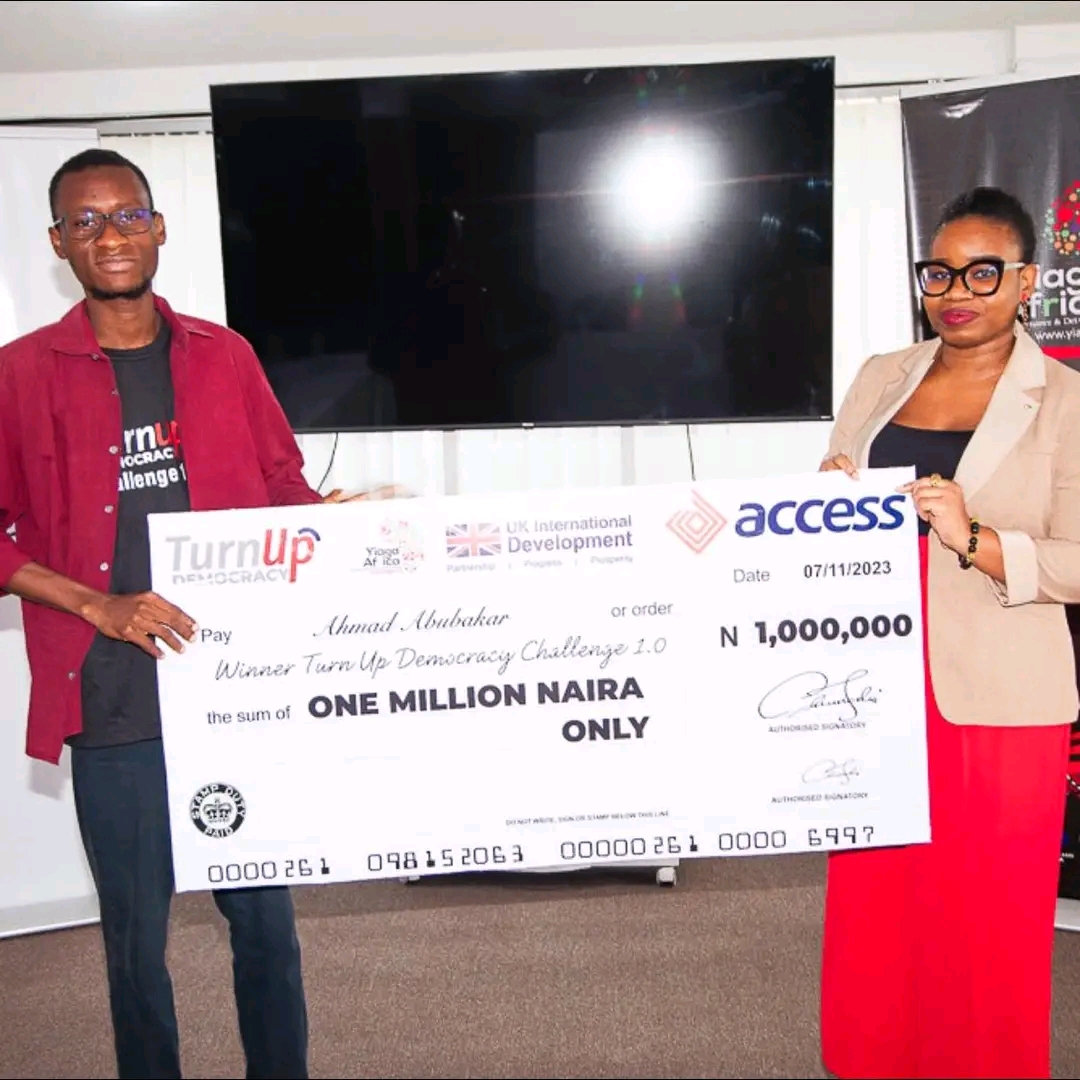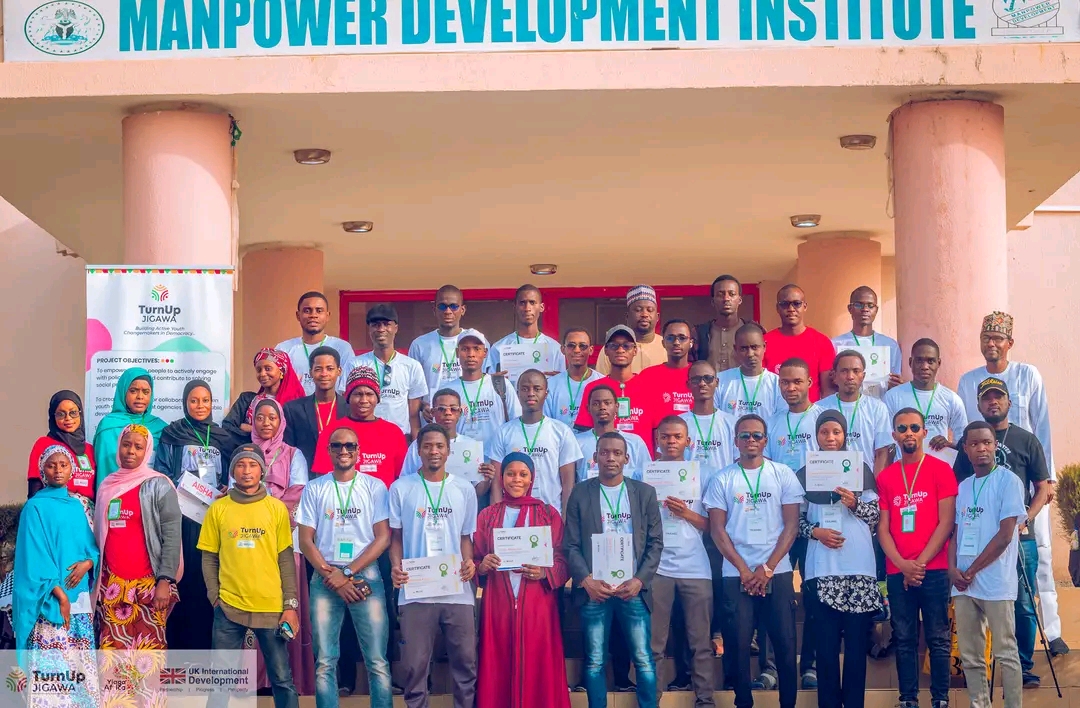Zulaihat Waziri had been seeking a chance to participate in leadership programs that tutored young people on team building, effective communication and impact-making. But the opportunities seemed out of her reach until one evening in December 2023.
Waziri, who lives in Gumel in the Nigerian state of Jigawa, was scrolling through stories on her Instagram page when she came across the application link of a leadership-training program. Among other perks, the program assured training in leadership, advocacy, and communication skills.
“I believe it’s programs like these that will enable me to harness my potential and learn the steps required to become an active citizen who is capable of bringing the desired change,” the 19-year-old explained.
A few days later, after she had applied for the program, Waziri received an email, confirming her acceptance into the program. She could hardly contain her joy. The program would be a stepping-stone to greater leadership strides in her community, she assured herself.
Like Waziri, Fahad Harazumi lives in Jigawa, although in Mallam Madori local government area. He nurtured a passion for community service and development and volunteered for several developmental initiatives as a teenager. So, when he saw the application link for the Turnup Jigawa program on Facebook, he didn’t hesitate to apply.
“I followed the link and I was asked to fill in a Google form which I did and after some days, I received a mail that I have been selected to be part of the fellows of the program,” Harazumi recounted.
The Genesis
Pushing for inclusive governance that promotes civic engagement has been the focus of 25-year-old Ahmad Abubakar since 2019.
From the moment Abubakar learned about the challenges that kept communities in Jigawa state mostly underdeveloped, he began to think about possible solutions. These challenges included youth unemployment, poor education, and inadequate healthcare service delivery.
Abubakar’s observation was true. As of 2021, Nigeria’s total unemployed population reached approximately 6.3 million, with Jigawa State recording a high unemployment rate of 38.69% in 2020. Unfortunately, this trend of increasing unemployment persists on a national scale.
In 2022, a UNESCO report highlighted the plight of over 700,000 children in underserved communities within Jigawa State, contributing to the 20 million children in Nigeria who are deprived of education, according to UNICEF.
Jigawa’s poor healthcare service was a microcosm of the challenges of poor infrastructure, mismanagement, and insufficient financing, adversely affecting the quality of healthcare services nationwide.
On his part, Abubakar thought advocacy and volunteerism could play a key role in addressing these concerns. In the years since 2019, he has volunteered in community service and has mobilized youths in the local communities and on social media.
Abubakar got his breakthrough in volunteering in September 2023, when he received a N1,000,000 grant from Yiaga Africa through its Turnup Democracy Challenge 1.0. Abubakar’s project proposal, one of the nine selected projects across the country, was exceptional, according to the organizers. The successful applicants were expected to implement their proposed projects in local communities within their state.

Turnup Jigawa
Upon receiving the grant, Abubakar headed back to Jigawa and launched the Turnup Jigawa, focused on raising active young change-makers who can promote democracy and community development initiatives.
As part of its mission, the project supports advocacy initiatives, where communities can engage with their lawmakers to solve social problems by advocating for policies that best address their basic rights.
“We targeted two categories of people. Firstly, it’s the direct target groups: young people aged 18-35, which are gender-inclusive, and persons with disabilities, who we believe will all actively participate in the project activities. Secondly, it’s the intermediate target group: local communities; residents of Jigawa state who we also believe will benefit from the positive impact of youth-led initiatives and improved social cohesion; and then government agencies, including local government officials and policymakers who will engage with youth representatives,” Abubakar explained to Prime Progress.
To fully implement the project, applications were sent out, and over 700 submissions were received. Only 30 youths, including Waziri and Harazumi, were selected from the hundreds of applications. These 30 lucky youths were mentored by seasoned facilitators on leadership and communication, among others.
Beyond the training, the project also facilitated social media campaigns, promoted its activities on radio programs, and organized campus tours and town hall meetings to expand its reach.
Testimonies
Today, some of the fellows from Turnup Jigawa are champions in their respective communities, where they spearhead community development initiatives. They have equally organized a number of projects to boost their confidence in effecting positive change.
After his training at the Turnup Jigawa program, Harazumi went back to his community to carry out a sensitization campaign on environmental sanitation and hygiene. “I earlier organized a team that helped me to carry out the activities successfully,” Harazumi shared.
The idea was to make the residents accept the full responsibility of protecting and cleaning their environments. Some of them have expressed their joy in this new development and hope to see more of it in the future.
Abdulmajid is one of the many residents of Malam Madori who learned the importance of maintaining a healthy environment. “During the activity, we understand how to clean our surroundings and how to prevent ourselves from any environmental infections,” he said.
Before her training at Turnup Jigawa, Waziri discovered that students in her community were not accepted for admission in universities because they lacked proper career guidance and counselling in secondary school.
So, as part of her step-down projects, she organized a program known as the Guidance Initiative, a hub of like-minded individuals who come together to steer secondary school students towards better career choices.
“With the help of some community volunteers, we were able to equip some of the students with the skills, ethics, and values needed in preparation for a sustainable career,” she narrated.

Waziri is also going the extra mile in her advocacy initiatives to enhance transparency and promote accountability. She hopes that her efforts will lead to addressing the issues children face across communities in Jigawa state.
“Our efforts include engaging with traditional leaders so that they will be transparent about their decisions and actions,” she added.
But Waziri isn’t alone in this struggle. Fellows of the Turnup Jigawa program are also advocating for policies that best serve the interests of their communities, leveraging the reach of digital platforms to question systems and hold their leaders accountable.
This is one of several attempts made by young change-makers in Nigeria to encourage active participation in local decision-making, democracy, and grassroots governance. Yet it is not without shortcomings.
Operational challenges
As a passionate changemaker, Waziri funds her initiatives and advocacy engagements all on her own, and this is constraining her ability to reach every stakeholder in the process.
Harazumi, on the other hand, finds it hard to get people to see community building as comprising both the government and the public. He also pointed out the challenge of involving both male and female youth in the community sanitation program.
Abubakar further highlighted that one of the major operational challenges the Turnup Jigawa program encountered was the limited resources and inadequate funding, which affected the scale and reach of the project.
“We faced challenges due to logistical issues, including transportation and accommodation of participants’ difficulties, which occasionally hindered the timely and seamless execution of the training sessions,” Abubakar told Prime Progress.
Resilience
Examining these challenges, Abubakar and his team have gleaned their lessons, which they hope to implement in subsequent editions of the program. Among their plans to enhance their programs are forging strategic partnerships with local businesses, educational institutions, and government agencies to broaden their reach and influence.
Harazumi, on his part, reiterated the importance of forming continuing collaborations to sustain positive actions in the lives of his people.
“I want to continue putting smiles on people’s faces,” Harazumi said.
Zulaihat Waziri from Jigawa, Nigeria, had been looking for leadership programs but found them inaccessible until she discovered one on Instagram in December 2023, which focused on leadership, advocacy, and communication. After getting accepted, she saw it as a crucial step towards making a community impact. Similarly, Fahad Harazumi, also from Jigawa, applied for the Turnup Jigawa program and was selected. Their journey is part of a larger initiative started by Ahmad Abubakar in 2019 to address issues like youth unemployment, poor education, and inadequate healthcare in Jigawa through advocacy and volunteerism.
Abubakar received a N1,000,000 grant from Yiaga Africa through its Turnup Democracy Challenge, using it to launch Turnup Jigawa aimed at empowering young people and promoting democracy and community development. The program received over 700 applications, selecting 30 youths, including Waziri and Harazumi, who were trained in leadership and communication. The project also included social media campaigns, radio promotions, and community engagement activities.
Following their training, participants like Harazumi initiated community projects on environmental sanitation, while Waziri organized career guidance initiatives for secondary school students. Despite funding and logistical challenges, the project's impact on community development is notable, with plans to forge strategic partnerships to sustain and expand their reach. Turnup Jigawa fellows continue to advocate for policies that serve their communities, using digital platforms to promote governance transparency and accountability.






